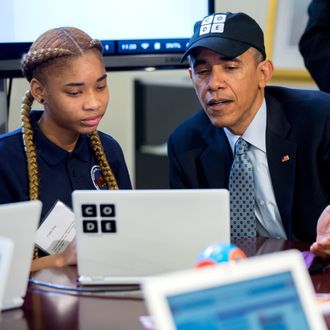
On Thursday, the Federal Communications Commission approved new net-neutrality rules, and, as you’d expect, everyone on the internet is now wondering what it all means.
But seeing as the rules still need to survive bureaucratic lethargy, Congress, and litigation threats, who knows exactly what the change could mean, and if consumers will even notice. (The New York Times reports that the Netherlands still exists despite similar regulations having been in place there for two years.)
The question of why net-neutrality rules were approved yesterday despite massive protest from powerful broadband companies with armies of lobbyists and the Republican majority in Congress, as well as the fact that the FCC is currently chaired by someone many pro-net-neutrality advocates have been skeptical about, is a slightly easier thing to unpack.
The chain of events leading to yesterday’s vote began when a federal appeals court in D.C. struck down existing net-neutrality rules in 2014 and the FCC began to consider whether broadband companies should be able to charge websites for better access, among other changes coveted by that industry.
The FCC opened up the debate over these possible changes to the public, and the agency was flooded with millions of public comments being filed — taking the telecommunications outrage record from those who complained about Janet Jackson’s Super Bowl wardrobe malfunction in 2004. The Sunlight Foundation analyzed the comments and found that a majority seemed to support net neutrality.
After the commenting period closed, President Obama — who is on the record in support of net neutrality since at least 2007 — weighed in with a pro-net neutrality statement and mentioned that the FCC should listen to what the public was telling them. On Thursday, he tweeted about the FCC’s decision, again calling attention to the activists: “That’s the power of millions making their voices heard.” He also sent a note to Reddit congratulating the efforts of its users: “Earlier today, the FCC voted to protect a free and open internet — the kind of internet that allows entrepreneurs to thrive and debates over duck-sized horses and horse-sized ducks to persist.” White House Press Secretary Josh Earnest noted yesterday that the new rules were “in line and consistent with the position that the President had articulated last November.”
If there’s anything we’ve learned about the president during his career and campaigns, it’s that he loves nothing more than being able to #humblebrag about his grassroots support. And after the electoral losses that occurred right before Obama’s big net-neutrality announcement, the White House was a bit hungry for some love from its base.
Of course, it would be impossible for anything to change policy-wise, even with a big push from Obama, unless FCC commissioners agreed with him. Luckily for the president, he has been in office long enough that every commissioner has been nominated by his administration, and there are the maximum number of three Democratic commissioners on the five-person panel. The last commissioner was sworn in on November 4, 2013, before competing worries about net neutrality ramped up. By the time Obama needs to nominate a new commissioner next year, the Republican Senate will be primed to quiz any candidate about their net-neutrality leanings.
The two Republican commissioners on the FCC did not vote in favor of yesterday’s proposal and saw the quick approval of a plan following the contours of Obama’s call to arms as executive overreach. Republican commissioner Ajit Pai released a statement saying the only reason the FCC considered this “government control of the Internet” was because “President Obama told us to do so.”
On Capitol Hill, Republican committee chairs plan to investigate the White House’s role in the FCC deliberations. Senator Ted Cruz has previously called the regulations “Obamacare for the Internet.”
Many Democratic lawmakers have praised the FCC, without mentioning Obama at all. Senator Al Franken brought it up on the Senate floor, saying, “Last spring, I could not have predicted that we would be celebrating this victory today. The best principles of our democracy have won out.”
Regardless of who is deemed responsible for the net-neutrality change of fortune, it is unlikely that the rules will improve or worsen anyone in Washington’s approval rating outside the small, if also loud and money-clogged, world of telecommunications and tech (unless, of course, broadband companies are right and the Internet’s Judgment Day is nigh). The University of Delaware conducted a poll last fall that showed 50 percent of respondents knew nothing about the net-neutrality debate. The segment of the population who knew most about the net-neutrality debate were fans of John Oliver’s HBO show.





























